10 Best Similarweb Alternatives
Find specialized platforms for SEO, PPC, and traffic analysis that match your workflow and budget
Blogby JanSeptember 29, 2025
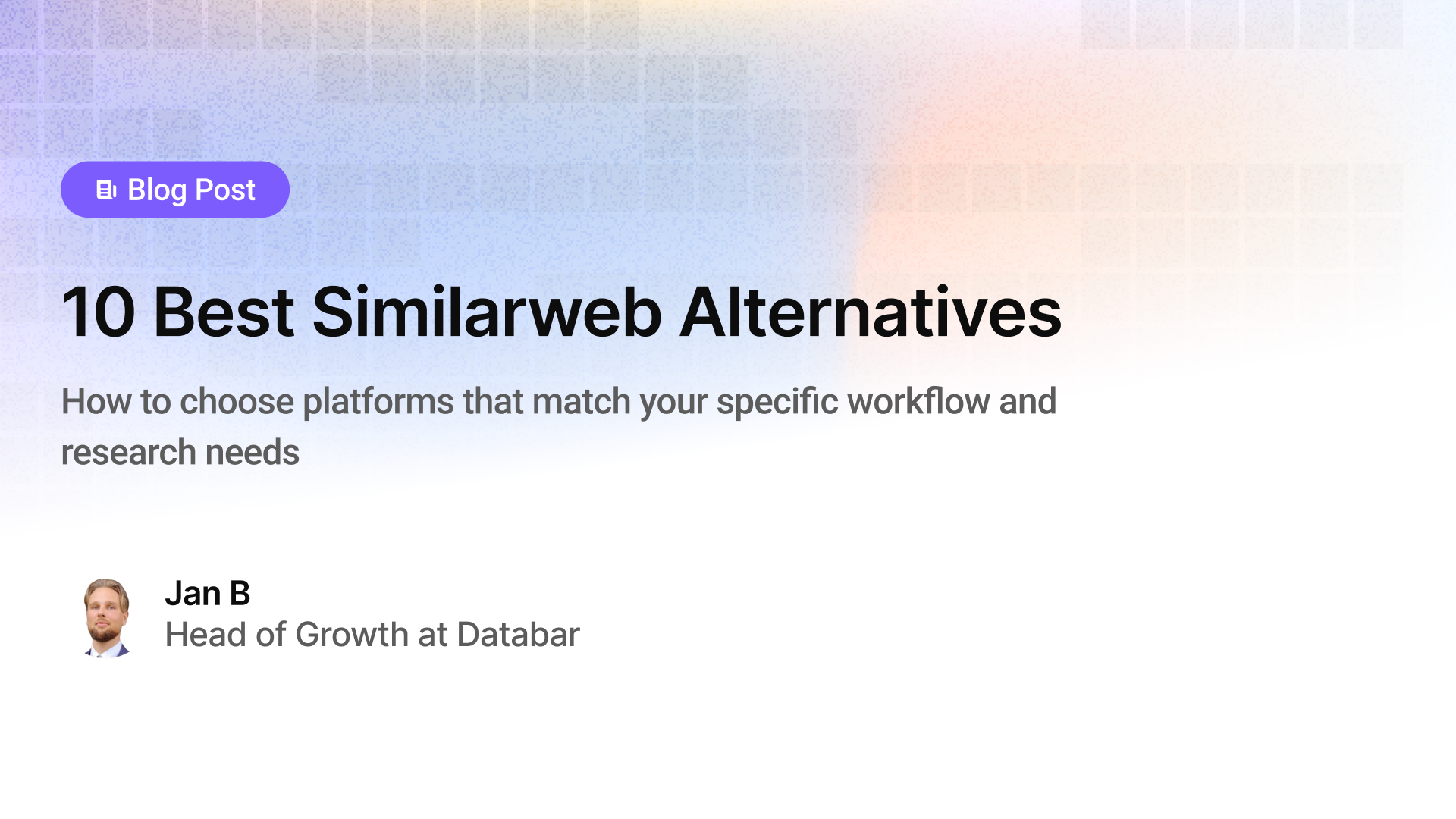
You're building a target account list for Q1. You need to understand which companies get significant web traffic, what technologies they use, whether they're growing (hiring signals), and who the decision-makers are.
That intelligence doesn't live in one platform. Traffic data comes from one source. Technology stack from another. Contact information from a third. Company firmographics from a fourth.
Most teams face a choice: invest in one comprehensive platform that does everything moderately well, or use specialized tools that excel at specific types of intelligence.
Similarweb takes the comprehensive approach—providing visibility into website performance, audience behavior, competitive benchmarking, mobile app intelligence, and advertising insights all in one place. It's a powerful platform for teams needing broad digital intelligence across channels.
But that breadth comes with complexity and cost. Many teams find they primarily need one or two types of competitive intelligence—strong SEO capabilities, detailed PPC competitor data, or basic traffic analysis—without requiring Similarweb's full feature set.
This guide explores when Similarweb makes perfect sense, ten excellent alternatives that specialize in different aspects of competitive research, and how to access Similarweb data through integrated enrichment platforms as a third option.
Whether you need focused SEO capabilities, search marketing intelligence, or agency-specific features, there's likely a platform optimized for your specific workflow at a price point that makes more sense than comprehensive tools.
When Similarweb Is the Right Choice
Before exploring alternatives, let's establish when Similarweb makes perfect sense and you shouldn't spend time evaluating other options.
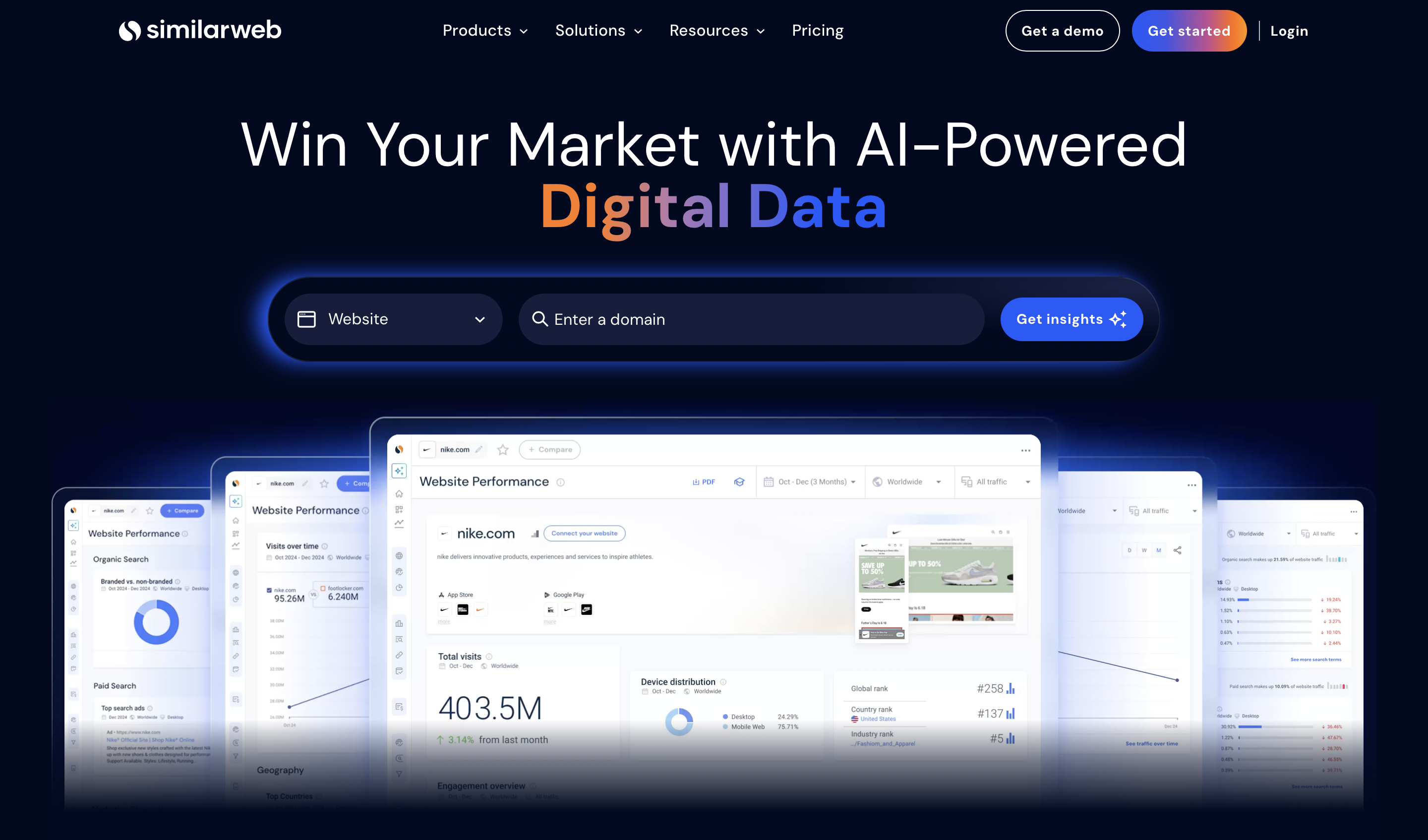
You need digital intelligence across channels
Similarweb provides integrated intelligence across web traffic, mobile apps, advertising, and market research. If your role requires answering questions across these dimensions—"How do competitors perform on mobile?" "What's our market share across channels?" "Which advertising networks drive competitor traffic?"—that breadth justifies Similarweb's comprehensive approach.
The platform was built for teams needing complete digital visibility, not just website traffic analysis.
You're analyzing high-traffic websites regularly
Similarweb's data collection methods work exceptionally well for sites with significant traffic volumes. If your competitive set includes major players with 500,000+ monthly visitors, Similarweb delivers reliable intelligence that informs strategic decisions.
Analyzing major ecommerce sites, popular SaaS platforms, or leading media properties—Similarweb's extensive data provides insights at that scale.
Enterprise workflows and dedicated resources
Large organizations benefit from Similarweb's advanced capabilities—extensive API access, custom reporting, dedicated support, and sophisticated market research features. When you have teams dedicated to competitive intelligence and substantial analytics budgets, Similarweb's enterprise features deliver value.
Investment research and market analysis
Similarweb's unique combination of web analytics, app intelligence, and market data serves investors, analysts, and strategy teams conducting market research or evaluating potential investments. The breadth of intelligence across digital channels provides context that specialized tools don't offer.
> Get started with Similarweb inside Databar today >
The 10 Excellent Similarweb Alternatives
For teams who need specialized competitive intelligence rather than Similarweb's comprehensive breadth, these platforms excel at specific workflows.
1. Semrush
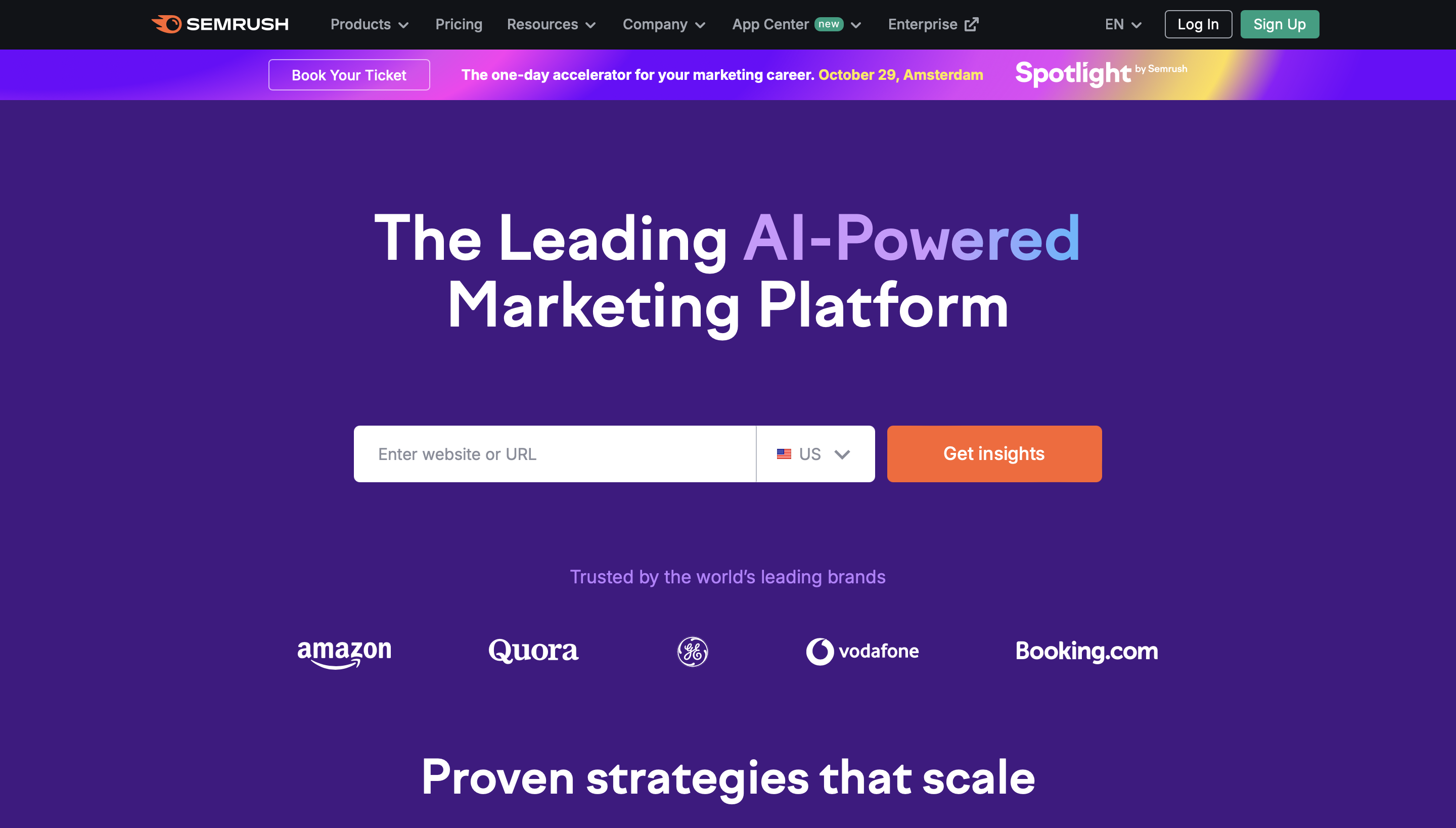
Best for: Teams prioritizing SEO alongside competitive traffic analysis
Semrush provides extensive marketing intelligence across SEO, PPC, content marketing, and competitive research. The Traffic Analytics module delivers competitive insights similar to Similarweb while the platform's strength lies in comprehensive SEO capabilities.
With over 25 billion keywords, extensive backlink analysis, rank tracking, and content optimization tools, Semrush serves teams where SEO is primary and competitive traffic analysis is complementary.
What Semrush excels at:
- Comprehensive keyword research across multiple search engines
- Detailed backlink analysis and link building intelligence
- Content gap analysis revealing competitor content opportunities
- Technical SEO auditing and site health monitoring
- Competitive PPC intelligence alongside organic research
Platform strengths:
- Integrated workflow from research to optimization
- Strong API access for automation and integration
- Extensive training resources and certification programs
- Regular feature updates and platform improvements
Pricing: Starts at $139.95/month for Pro plan. Traffic Analytics requires .Trends add-on at $289/month, totaling $428.95/month for comprehensive competitive intelligence with SEO capabilities.
Ideal users: Marketing teams where SEO drives primary strategy, agencies managing client SEO programs, content teams optimizing for search visibility.
2. Ahrefs: SEO-Focused Competitive Intelligence
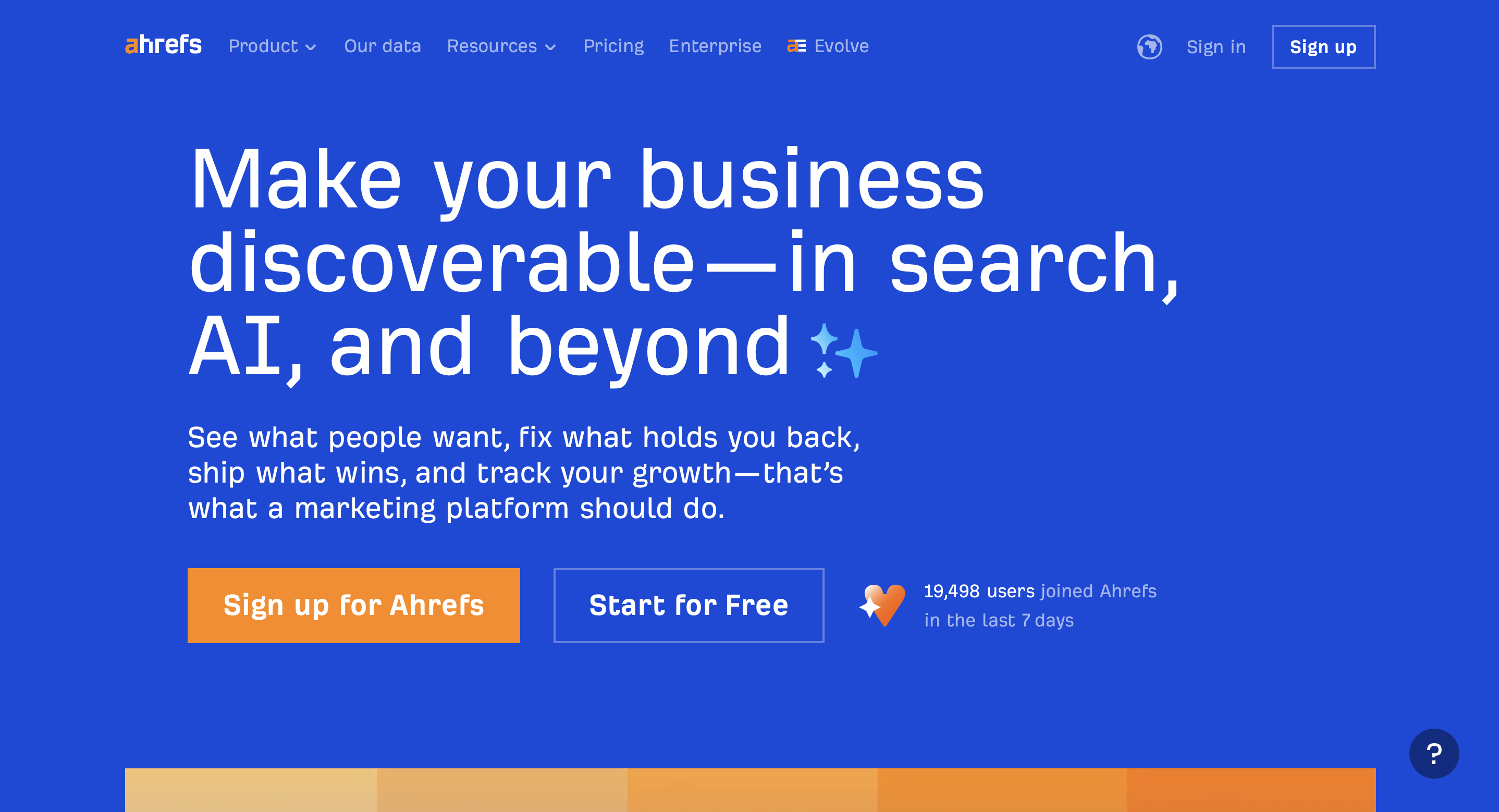
Best for: SEO professionals and content marketers
Ahrefs built its reputation on the internet's second-largest backlink index and has expanded into comprehensive SEO intelligence. Site Explorer provides traffic estimates and competitive insights, but the platform's true strength is SEO depth.
Understanding not just competitor traffic, but exactly which content drives that traffic, which backlinks power rankings, and which keywords present opportunities—this actionable intelligence serves SEO-focused workflows.
What Ahrefs excels at:
- Industry-leading backlink analysis and link research
- Accurate organic traffic estimates based on ranking positions
- Content Explorer revealing successful content across the web
- Keyword research with accurate difficulty metrics
- SERP analysis showing ranking factors
Platform strengths:
- Clean, intuitive interface with minimal learning curve
- Fast data processing and responsive platform
- Excellent educational content and community
- Regular index updates maintaining data freshness
Pricing: Starts at $129/month for Lite plan. Standard plan at $179/month provides features most teams need. Note that some operations consume credits beyond monthly allowances.
Ideal users: SEO professionals, content marketing teams, digital publishers, anyone prioritizing organic search growth.
3. SE Ranking
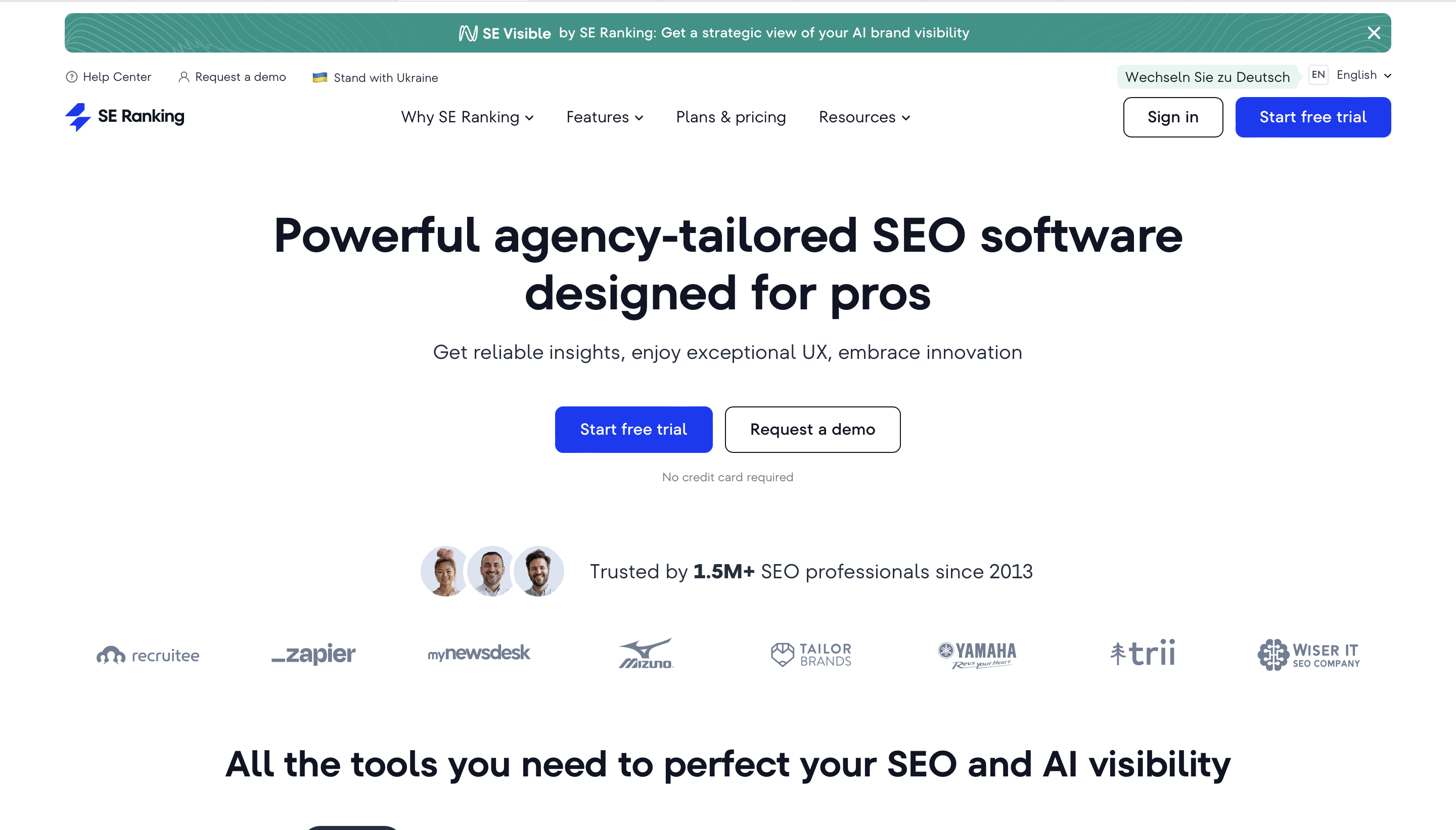
Best for: Small teams and agencies seeking comprehensive features at accessible pricing
SE Ranking delivers strong SEO and competitive intelligence capabilities at pricing that serves small teams and agencies. While not matching the scale of premium platforms, it covers essential competitive research, keyword tracking, backlink analysis, and client reporting.
The platform's strength is balancing capability with usability—teams become productive quickly without overwhelming complexity.
What SE Ranking excels at:
- White-label reporting perfect for agency client delivery
- Flexible rank tracking with accurate local results
- Solid keyword research and competitor analysis
- Marketing plan features for strategy development
- Page changes monitoring for competitive tracking
Platform strengths:
- Intuitive interface requiring minimal training
- Strong customer support and responsive team
- Regular feature additions and improvements
- Good API access for workflow integration
Pricing: Starts at $59/month for Essential plan. Pro plan at $119/month offers comprehensive features for growing teams.
Ideal users: Small marketing teams, digital agencies, consultants, growing businesses needing professional features without enterprise costs.
4. SpyFu
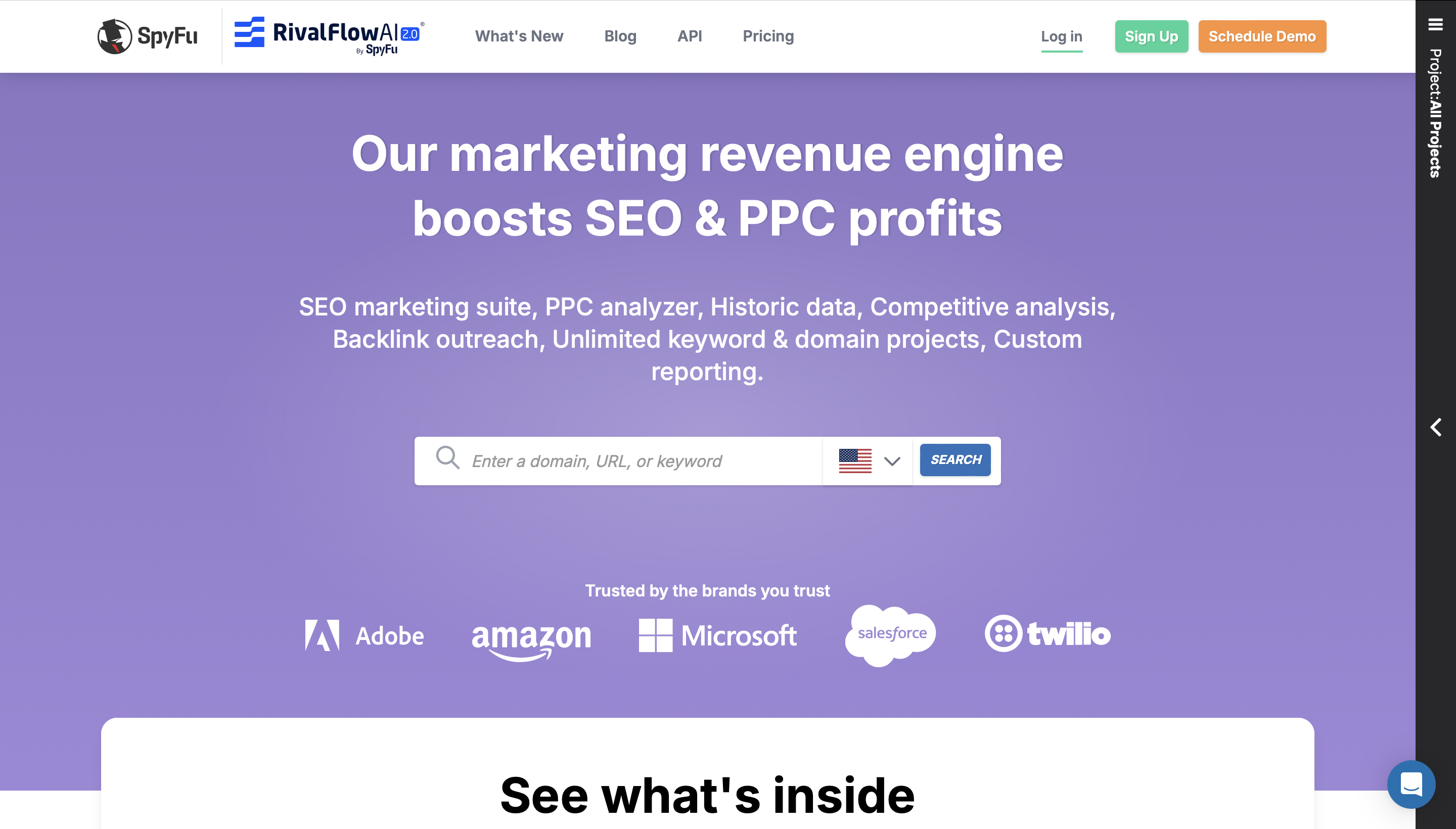
Best for: PPC managers and search marketing teams
SpyFu specializes in search marketing intelligence—revealing every keyword competitors buy on Google Ads, their ad copy evolution, testing patterns, and budget estimates. For organic search, the platform shows complete keyword history and ranking changes over time.
The unique value is historical perspective—data going back 15+ years reveals how competitor strategies evolved, what worked, and what changed.
What SpyFu excels at:
- Comprehensive PPC competitor intelligence
- Ad copy history showing testing and evolution
- Budget estimates for competitor ad spending
- Organic keyword history and ranking trends
- Keyword overlap analysis revealing shared opportunities
Platform strengths:
- Affordable pricing with generous data access
- Simple interface focused on actionable insights
- Strong landing page analysis capabilities
- Effective competitor comparison features
Pricing: Starts at $39/month for Basic plan. Professional at $79/month offers extensive features for search marketers at accessible pricing.
Ideal users: PPC managers, search marketing teams, agencies managing paid campaigns, anyone competing heavily in paid search.
> Get started with SpyFu inside Databar >
5. Mangools
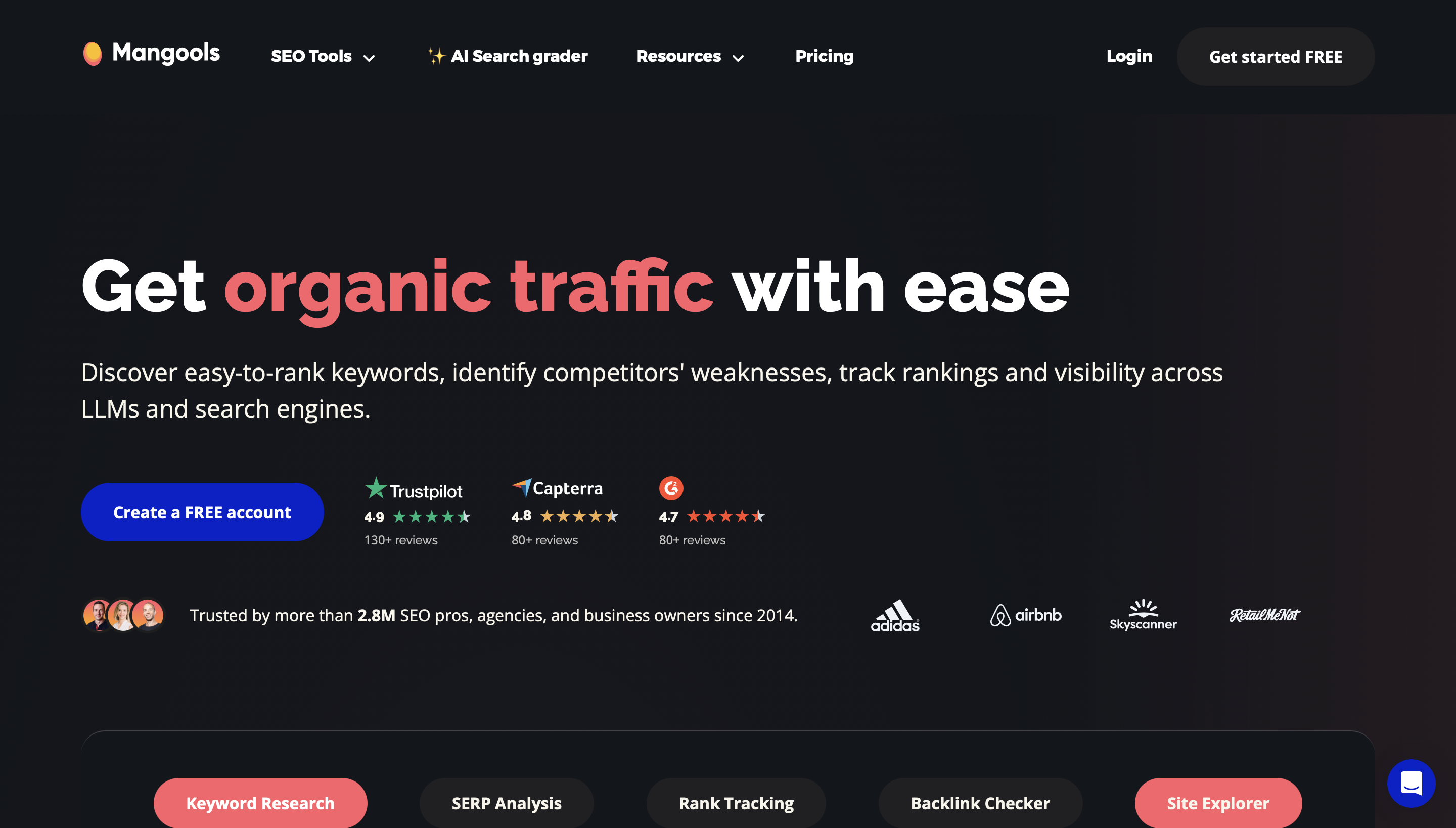
Best for: Solo marketers, small businesses, and budget-conscious teams
Mangools bundles five focused tools—KWFinder (keywords), SiteProfiler (site analysis), SERPChecker (SERP analysis), SERPWatcher (tracking), and LinkMiner (backlinks)—at pricing accessible to small teams and independent marketers.
SiteProfiler provides competitive intelligence including traffic estimates, domain authority, and backlink profiles. While less comprehensive than enterprise platforms, it serves basic competitive research needs effectively.
What Mangools excels at:
- Clean, attractive interfaces designed for non-technical users
- Excellent keyword difficulty analysis
- Local SEO capabilities and tracking
- Affordable pricing with fair usage limits
- Quick learning curve for new users
Platform strengths:
- Beautiful, intuitive design throughout
- Reliable data for core SEO metrics
- Good balance of features and simplicity
- Responsive customer support
Pricing: Starts at $29.90/month annually ($49/month if paying monthly). Agency plan at $79.90/month still very affordable.
Ideal users: Bloggers, affiliate marketers, small business owners, solo consultants, anyone needing solid SEO tools without complexity.
6. Serpstat
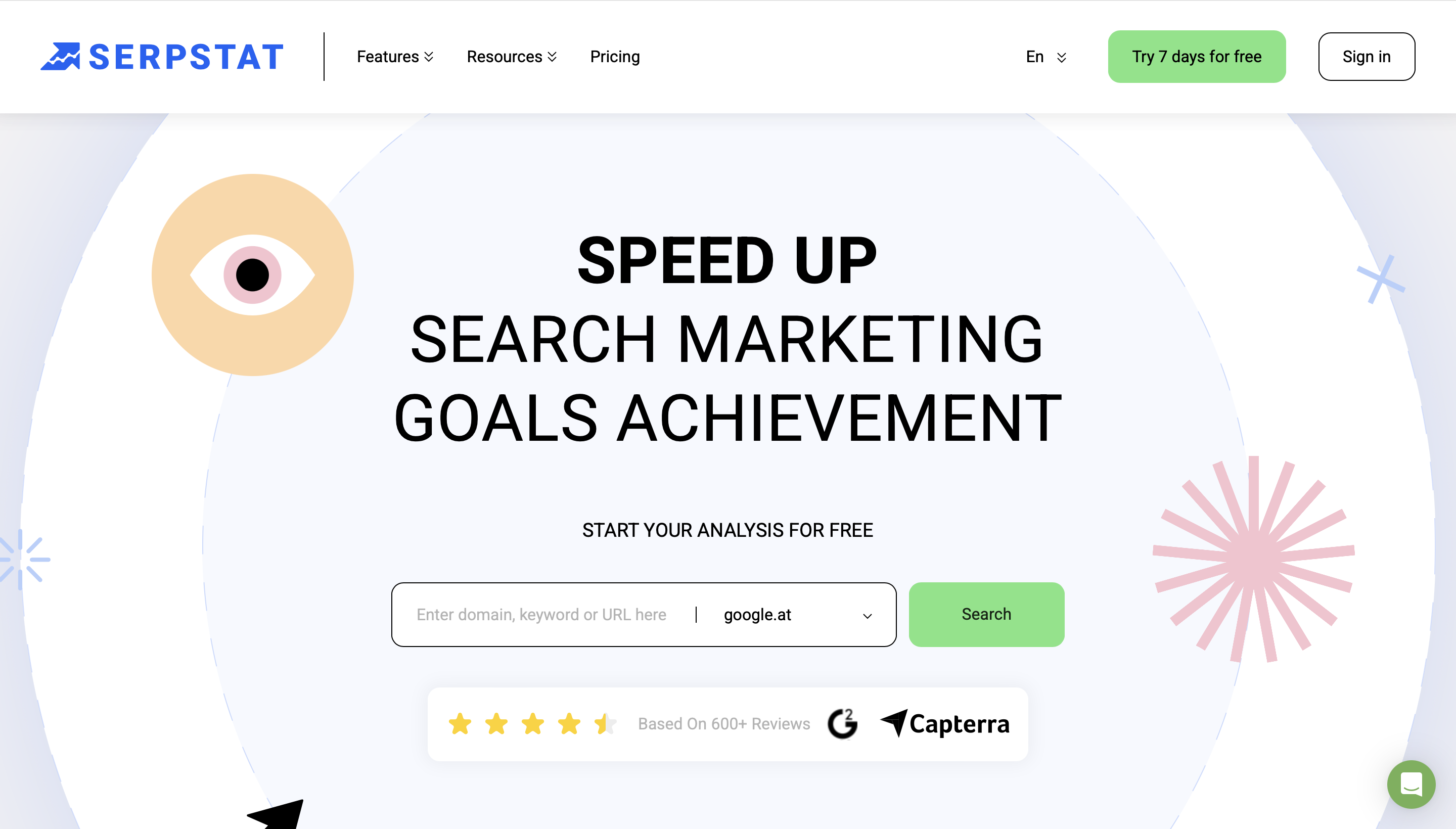
Best for: Teams needing strong SEO tools with competitive analysis
Serpstat provides extensive SEO and competitive intelligence at mid-tier pricing between budget tools and premium platforms. Particularly strong for European and international markets, the platform offers keyword research, rank tracking, backlink analysis, and site auditing.
Competitive analysis includes traffic trends, keyword gaps, and backlink profiles—solid functionality at fair pricing.
What Serpstat excels at:
- Strong international market coverage
- Batch analysis features for scaling research
- Good API access at reasonable tiers
- Keyword clustering for content planning
- Missing keywords analysis revealing opportunities
Platform strengths:
- Comprehensive feature set at accessible pricing
- Regular platform updates and improvements
- Growing database and coverage
- Flexible pricing tiers
Pricing: Starts at $59/month for Lite plan. Standard at $119/month provides strong value for growing teams.
Ideal users: Teams targeting international markets, businesses wanting Semrush-like capabilities at lower cost, agencies managing multiple clients.
7. Ubersuggest
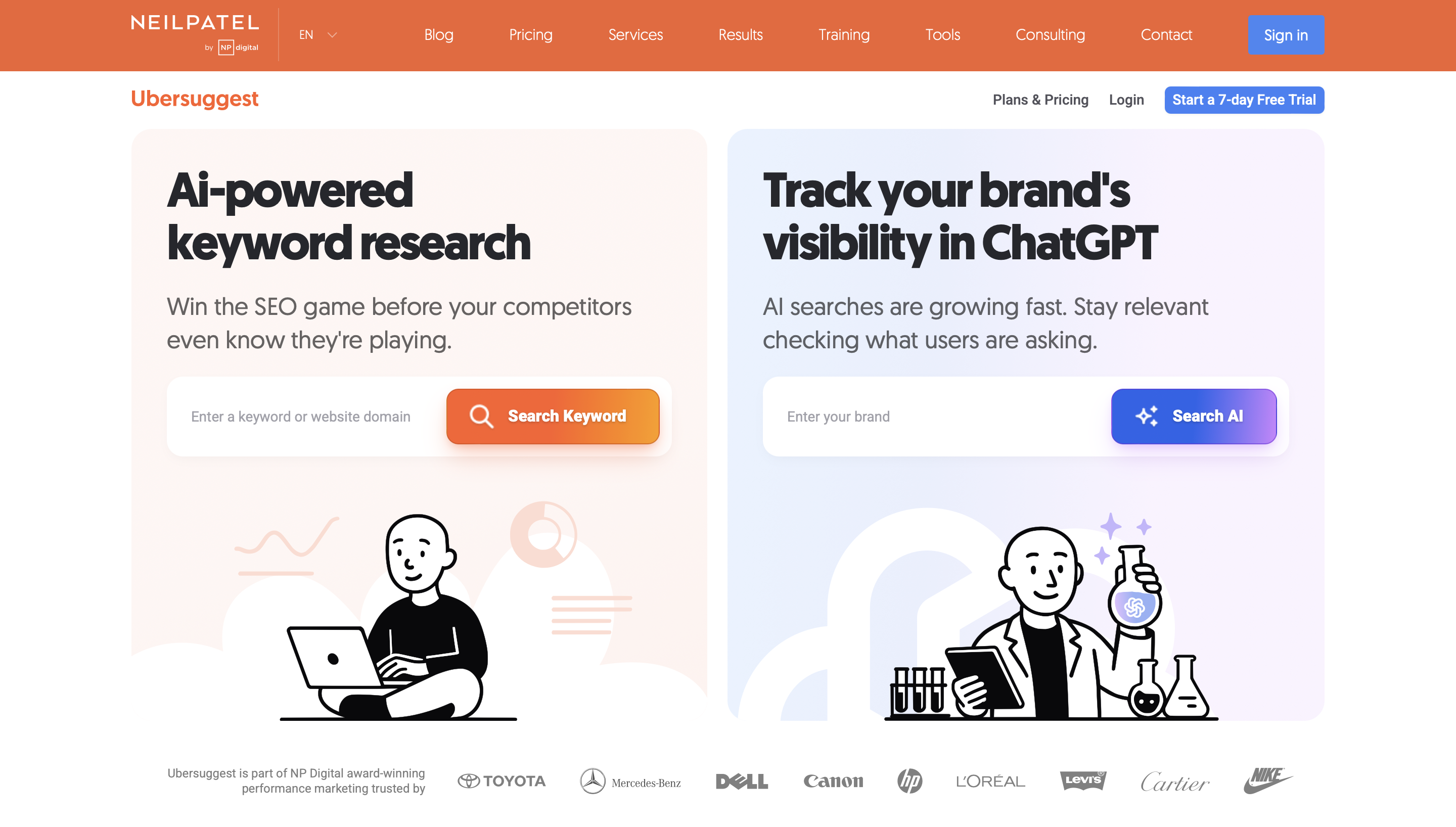
Best for: Small businesses wanting straightforward competitive research
Ubersuggest makes SEO and competitive analysis accessible through simplified interfaces and affordable pricing. Neil Patel's platform provides keyword research, traffic analysis, backlink data, and site auditing designed for non-experts.
With AI-powered content suggestions integrated, the platform serves small businesses combining competitive research with content creation.
What Ubersuggest excels at:
- Extremely simple, intuitive interface
- AI writing assistance and content ideas
- Chrome extension for quick competitive checks
- Affordable pricing including lifetime deals
- Good enough data for basic intelligence
Platform strengths:
- No learning curve required
- Clear, actionable recommendations
- Regular feature additions
- Strong educational content
Pricing: Monthly plans start at $29. Lifetime deals around $290 offer exceptional long-term value.
Ideal users: Small business owners, solopreneurs, content creators, anyone wanting basic competitive intelligence without complexity.
8. Nightwatch
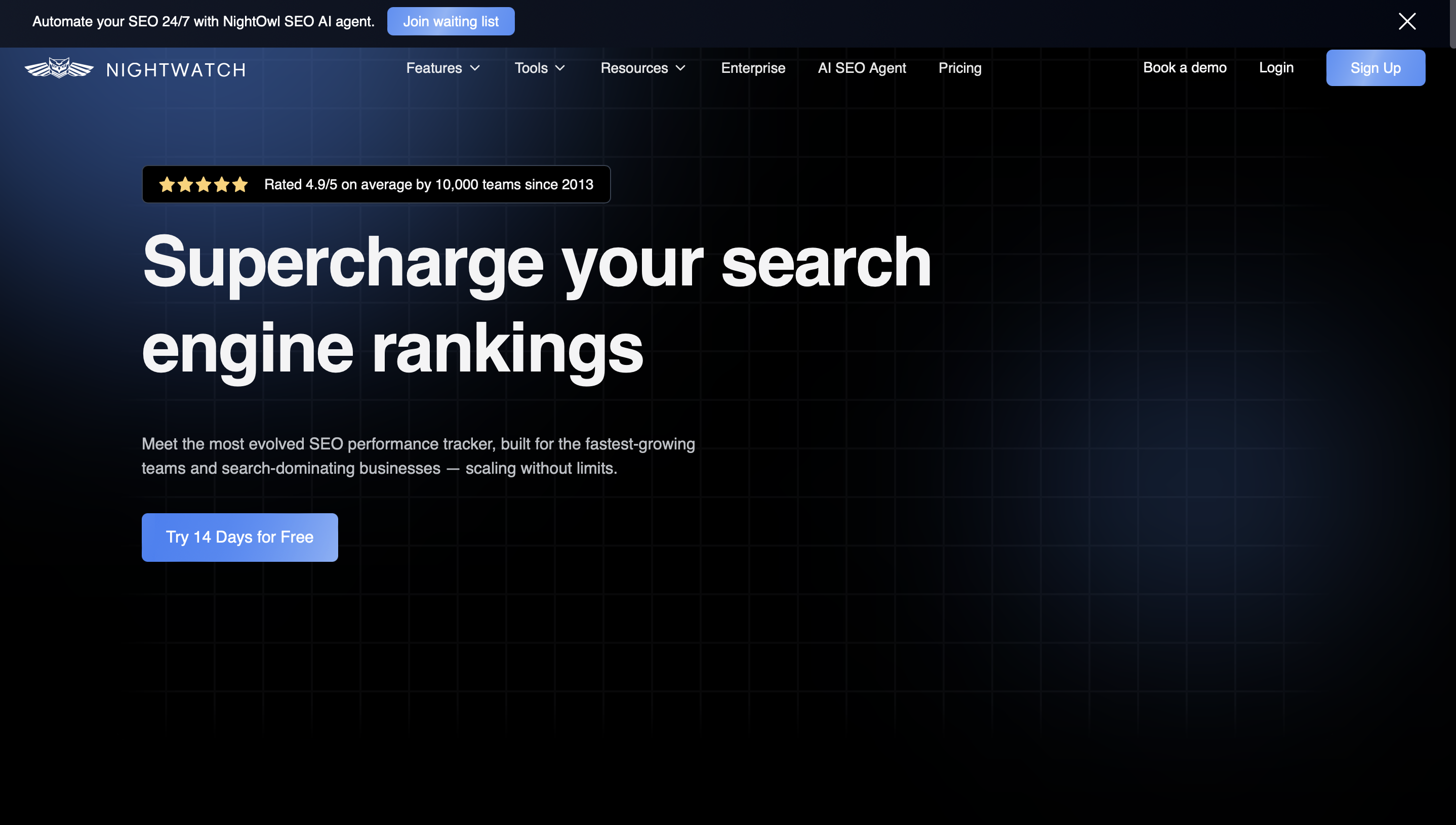
Best for: Agencies prioritizing accurate rank tracking with competitive monitoring
Nightwatch focuses on delivering exceptionally accurate rank tracking while providing solid competitive analysis. The platform excels at precise local tracking, SERP feature monitoring, and client-ready reporting.
For agencies where accurate rank tracking and clear client reporting are priorities, Nightwatch delivers focused capabilities.
What Nightwatch excels at:
- Highly accurate rank tracking with city-level precision
- Clean white-label reports for client delivery
- SERP feature tracking (snippets, local packs)
- Competitive keyword monitoring
- Strong visualization and reporting
Platform strengths:
- Focus on accuracy over feature breadth
- Excellent agency-specific features
- Reliable uptime and data collection
- Responsive support team
Pricing: Starts around $39-49/month, scaling with tracked keywords and domains.
Ideal users: Digital agencies, SEO consultants, professionals where rank tracking accuracy and client reporting are critical.
9. BrightEdge
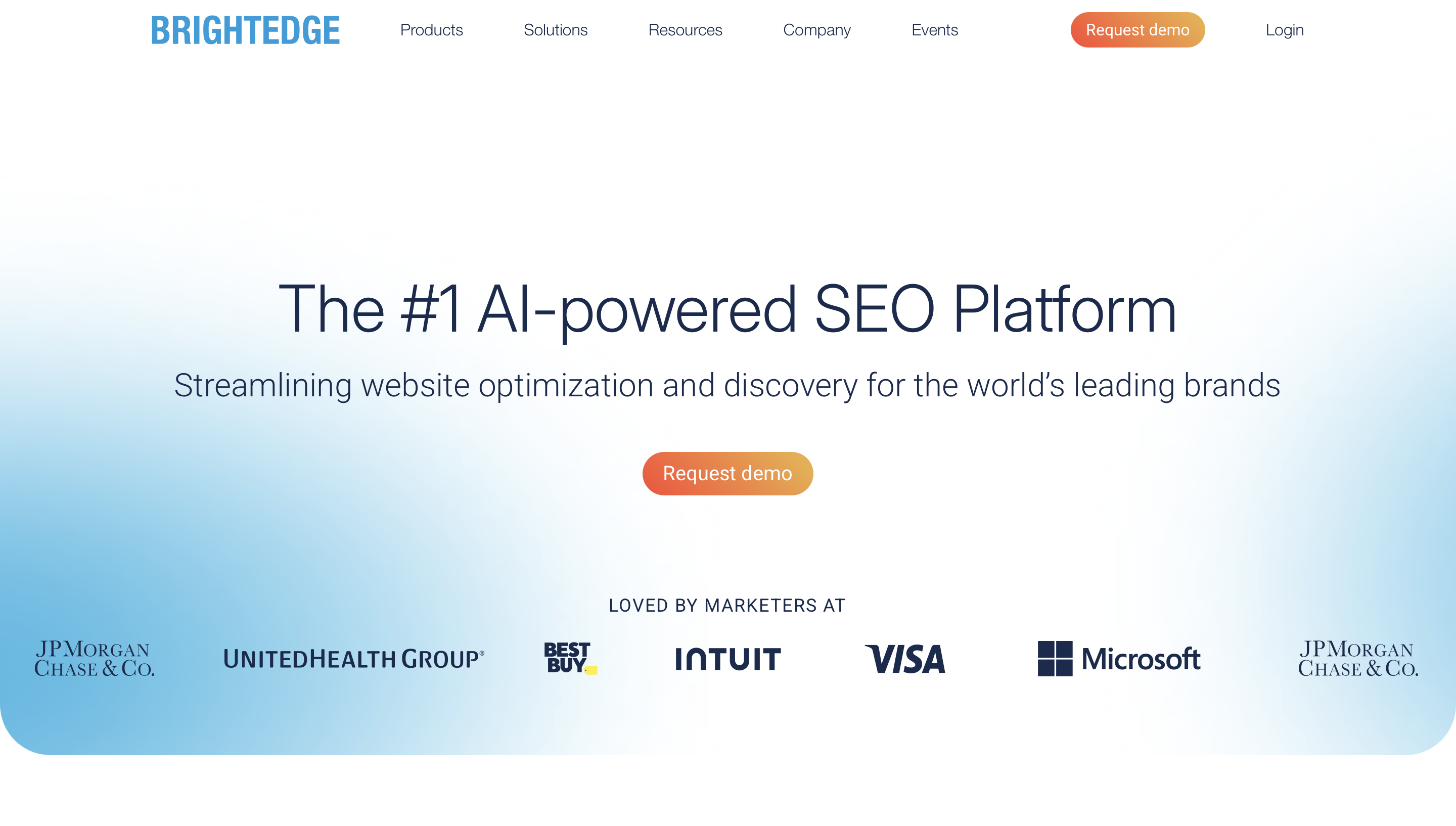
Best for: Large organizations managing complex SEO operations
BrightEdge serves enterprise SEO teams with sophisticated features including AI-powered recommendations, advanced competitive analysis, and deep integration with enterprise marketing technology.
DataCube research provides market share analysis, competitive intelligence, and content performance tracking at enterprise scale.
What BrightEdge excels at:
- Advanced SEO workflow automation
- Sophisticated content performance tracking
- Enterprise-scale competitive analysis
- Strong executive reporting and ROI tracking
- Deep mar-tech stack integration
Platform strengths:
- Built for complex, multi-site operations
- Advanced AI and machine learning capabilities
- Dedicated support and strategic consulting
- Strong security and compliance features
Pricing: Enterprise-only with custom pricing, typically starting $10,000+ annually.
Ideal users: Large enterprises, global organizations, companies managing SEO across multiple brands or regions.
10. Comscore
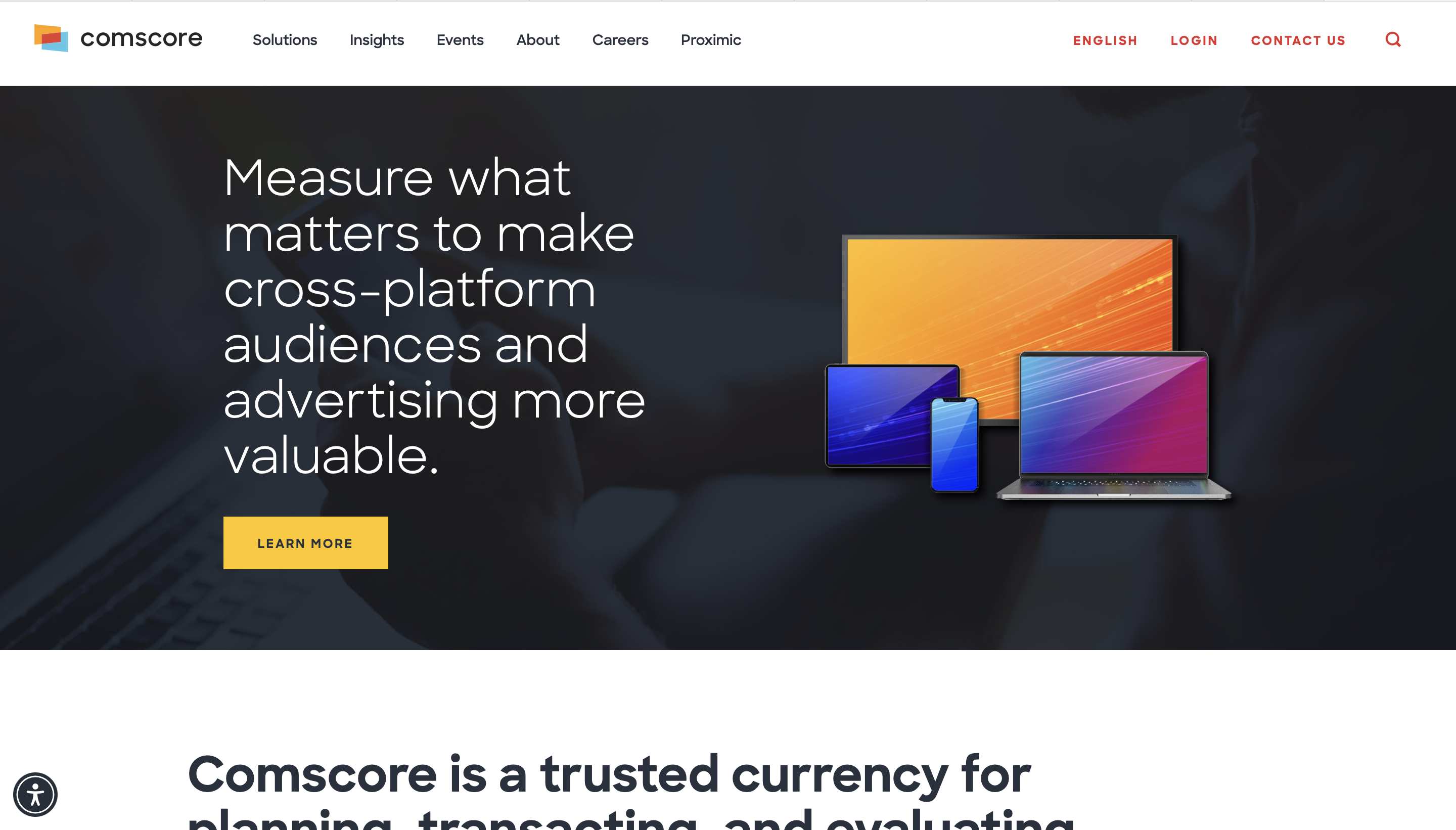
Best for: Media companies and enterprises needing deep audience insights
Comscore approaches competitive intelligence from audience measurement perspective—providing detailed demographic insights, media consumption patterns, and cross-platform behavior analysis.
This enterprise platform serves media companies, publishers, and large advertisers needing to understand audiences beyond basic traffic metrics.
What Comscore excels at:
- Deep audience demographic and psychographic data
- Cross-platform measurement (desktop, mobile, CTV)
- Advertising effectiveness measurement
- Media consumption pattern analysis
- Panel-based data for validation
Platform strengths:
- Industry-leading audience measurement
- Extensive historical data
- Strong media and publishing focus
- Comprehensive cross-platform tracking
Pricing: Enterprise-only with custom pricing typically $15,000-50,000+ annually depending on scope.
Ideal users: Media companies, large publishers, advertising agencies, enterprises where detailed audience insights are critical.
Accessing Similarweb Data Through Integrated Platforms
After exploring Similarweb itself and ten specialized alternatives, there's a third approach worth understanding—especially for teams building complete account profiles that combine multiple intelligence types.
For teams combining traffic data with technology intelligence, firmographics, and contact information, integrated enrichment platforms offer a hybrid approach.
Platforms like Databar integrate Similarweb's API alongside 90+ other data providers. This means you can access Similarweb's traffic analytics as part of broader account enrichment workflows rather than subscribing to Similarweb directly.
When you're enriching a list of target accounts, you might combine:
Similarweb traffic metrics - Visitor counts, bounce rates, engagement data
Technology stack intelligence - Which CRM, marketing automation, and infrastructure tools they use
Company firmographics - Employee count, revenue estimates, funding data
Contact information - Decision-makers and their verified contact details
Growth signals - Job postings indicating hiring and expansion
What Similarweb data is available through integrations
Through integrated connectors, teams access key Similarweb intelligence including:
Unique visitors data - Understanding traffic volume helps prioritize accounts and gauge digital maturity. Companies with growing traffic often signal expansion.
Bounce rate metrics - Engagement indicators reveal how well sites retain visitors. High bounce rates might indicate poor user experience or targeting issues.
Digital rank information - Global and country-specific rankings provide competitive context. Tracking rank changes over time reveals momentum.
Top-ranked websites - Discovering which sites dominate specific categories or regions informs competitive strategy and partnership opportunities.
When integrated access makes sense
CRM enrichment for target accounts - Sales teams enriching known prospect lists with traffic intelligence alongside other account data. You're not discovering new companies; you're deepening intelligence on accounts you've already identified.
Account-based marketing intelligence - Marketing teams building complete profiles of target accounts that combine traffic performance, technology usage, and contact information for personalized campaigns.
Competitive account research - Analyzing specific competitors you've identified, combining their traffic data with technology stack, team growth signals, and market positioning.
Investment due diligence - Investors evaluating specific companies, combining traffic trends with technology infrastructure, team expansion, and market performance indicators.
When full platform access makes more sense
If your workflow involves continuous market monitoring, discovering new competitors through traffic patterns, or your entire team needs daily platform access for various analyses, direct Similarweb subscription delivers better value despite higher costs.
Integrated access works for targeted intelligence on known accounts. Full platform access works for discovery and ongoing monitoring across broad market segments.
Understanding Similarweb API Access and Costs
If you're researching Similarweb API options, you've likely discovered that direct API access comes with significant barriers—both financial and technical.
Similarweb's API pricing isn't published openly. Enterprise contracts typically start around $40,000+ annually, with costs scaling based on data volume, API calls, and specific endpoints accessed. For most teams, this represents a substantial investment before even testing whether the data fits their workflow.
Beyond cost, direct API access requires technical implementation—building and maintaining integration code, handling rate limits, managing authentication, and combining Similarweb data with other sources in your application or CRM.
The integrated API approach
Data enrichment platforms provide an alternative path to Similarweb API access. Instead of negotiating enterprise contracts and building custom integrations, you access Similarweb data through platforms that have already integrated the API alongside other data providers.
Platforms like Databar maintain direct Similarweb API connections as part of their enrichment infrastructure. When you enrich accounts through these platforms, you're leveraging their API access rather than purchasing your own.
This approach offers several practical advantages:
No minimum commitments - Pay for actual usage rather than committing to enterprise minimums before knowing if the data serves your needs.
Immediate access - Start enriching accounts with Similarweb data today rather than waiting through enterprise sales cycles and technical implementation.
Combined intelligence - Access Similarweb traffic metrics alongside technology stack data, firmographics, and contact information in single enrichment workflows rather than building complex integrations between multiple APIs.
Simplified technical implementation - Use straightforward enrichment interfaces rather than managing API authentication, rate limits, and error handling across multiple providers.
What Similarweb API data you can access
Through integrated platforms, teams typically access the same core Similarweb intelligence available through direct API:
Traffic and engagement metrics - Monthly visits, unique visitors, pages per visit, average visit duration, and bounce rates for target domains.
Geographic distribution - Traffic breakdown by country, helping identify market concentration and expansion opportunities.
Traffic sources - Understanding whether sites drive traffic through direct visits, search, social, referrals, or paid channels reveals marketing strategy.
Competitor benchmarking - Comparative metrics showing how target accounts perform against industry peers or specific competitors.
Ranking data - Global and category-specific rankings providing competitive context and market positioning insights.
When direct API makes sense vs. integrated access
Direct Similarweb API contracts make sense for specific scenarios:
High-volume automated workflows - Applications making thousands of API calls daily for real-time competitive monitoring or customer-facing features justify direct access.
Product integration requirements - Building Similarweb data into your product as a core feature requires direct API relationships and typically custom data agreements.
Continuous market scanning - Teams constantly discovering and analyzing new companies based on traffic patterns benefit from unrestricted API access.
Integrated API access through enrichment platforms serves different workflows better:
Targeted account enrichment - Sales and marketing teams enriching known prospect lists with traffic intelligence alongside other account data.
Occasional competitive research - Teams needing competitive intelligence periodically rather than continuously.
Testing before committing - Organizations evaluating whether Similarweb data provides value before committing to enterprise minimums.
Multi-source intelligence workflows - Teams combining traffic data with technology stack, firmographics, and contact information in unified enrichment processes.
For most B2B teams, the integrated approach delivers the Similarweb intelligence they need without the complexity and cost of direct API contracts.
Choosing the Right Platform for Your Workflow
With multiple excellent options available, here's how to find your best fit.
Define your primary use case
Don't start with feature comparisons. Start with your main job to be done:
If SEO drives your strategy and you need occasional competitive traffic analysis, platforms like Ahrefs or Semrush excel at this workflow. If you're managing PPC campaigns and need competitive ad intelligence, SpyFu's search marketing focus serves you better. If you're an agency needing white-label reporting, SE Ranking or Nightwatch provide those capabilities. If you're a small business wanting straightforward competitive research, Mangools or Ubersuggest offer simplicity at accessible pricing.
Choose platforms optimized for what you do most, not those with the longest feature lists.
Match tools to your analysis scale
Consider the typical traffic levels you're analyzing:
For high-traffic sites (500K+ monthly visitors), premium platforms like Similarweb, Semrush, or Ahrefs provide accuracy worth their pricing. For mid-market sites (50K-500K monthly visitors), most alternatives including SE Ranking and Serpstat deliver good accuracy at better value. For smaller sites or local businesses (under 50K monthly visitors), budget-friendly tools provide data as reliable as expensive alternatives since all estimation-based tools face challenges at lower traffic volumes.
Consider integration with your existing workflow
Think about how competitive intelligence fits your broader processes:
If you're enriching CRM records with multiple data types, integrated platforms combining traffic data with technology intelligence and contact information might serve better than standalone analytics tools. If you're producing regular client reports, tools with strong reporting features matter more than extensive raw data access. If you're primarily optimizing your own sites with occasional competitor checks, platforms strong in site optimization with good competitive features make sense.
Test properly before committing
Most platforms offer trial periods. Use them effectively:
Analyze 5-10 competitors you know well, comparing results against your internal knowledge. Test your actual daily workflows, not just browsing features. Have real team members (not just decision-makers) evaluate usability. Check whether the learning curve fits your team's capacity. Verify that customer support responds helpfully when you have questions.
Proper testing reveals whether platforms fit your reality, not just whether they look impressive.
Finding Your Competitive Intelligence Solution
The right competitive analytics platform depends entirely on your specific workflow, team size, and strategic priorities.
Similarweb remains an excellent choice for comprehensive digital intelligence, particularly for teams analyzing high-traffic competitors and needing integrated insights across web, mobile, and advertising channels.
The specialized alternatives we've explored excel at focused workflows—SEO-focused platforms like Ahrefs and Semrush for organic search strategy, search marketing tools like SpyFu for PPC intelligence, agency-specific solutions like SE Ranking for client reporting, and budget-friendly options like Mangools for small teams.
For teams building integrated competitive intelligence—combining traffic data with technology intelligence, growth signals, and contact information—enrichment platforms offer a third path that accesses Similarweb data alongside other intelligence sources in unified workflows.
Your choice should reflect honest assessment of your primary use case. Not what sounds most comprehensive. Not what everyone else uses. What actually serves the specific competitive intelligence needs your team has right now.
Start by defining your main workflow. Match platforms to that workflow. Test the finalists with real work, not demo scenarios. Choose what genuinely improves your decision-making.
Because the best analytics platform isn't the one with the most impressive feature list or the biggest brand name. It's the one that helps you make better strategic decisions faster.
Frequently Asked Questions
What's the most affordable Similarweb alternative?
Ubersuggest offers the lowest ongoing costs at $29/month, with lifetime deals around $290 providing exceptional long-term value. Mangools starts at $29.90/month annually with more comprehensive SEO features. Both serve basic competitive intelligence needs at very accessible pricing points for small teams and independent marketers.
Which alternative provides the most accurate competitive data?
Semrush and Ahrefs typically deliver highly accurate competitive intelligence, particularly for mid-sized websites (10K-500K monthly visitors). Ahrefs excels at organic traffic accuracy through ranking-based calculations. For very high-traffic sites (500K+ visitors), most premium platforms including these alternatives and Similarweb achieve similar reliability levels.
Can I access Similarweb data without a direct subscription?
Yes, data enrichment platforms like Databar integrate Similarweb's API alongside other providers, enabling access to traffic metrics, bounce rates, and ranking data as part of broader enrichment workflows. This approach works well for teams enriching specific account lists rather than performing continuous market monitoring.
Do I need competitive analytics tools if I have Google Analytics?
Google Analytics provides excellent data about your own website but no visibility into competitor performance. Competitive analytics platforms exist specifically to analyze competitors whose internal data you can't access—revealing their traffic sources, top content, keyword strategies, and market positioning. The tools serve complementary purposes rather than overlapping ones.
Related articles
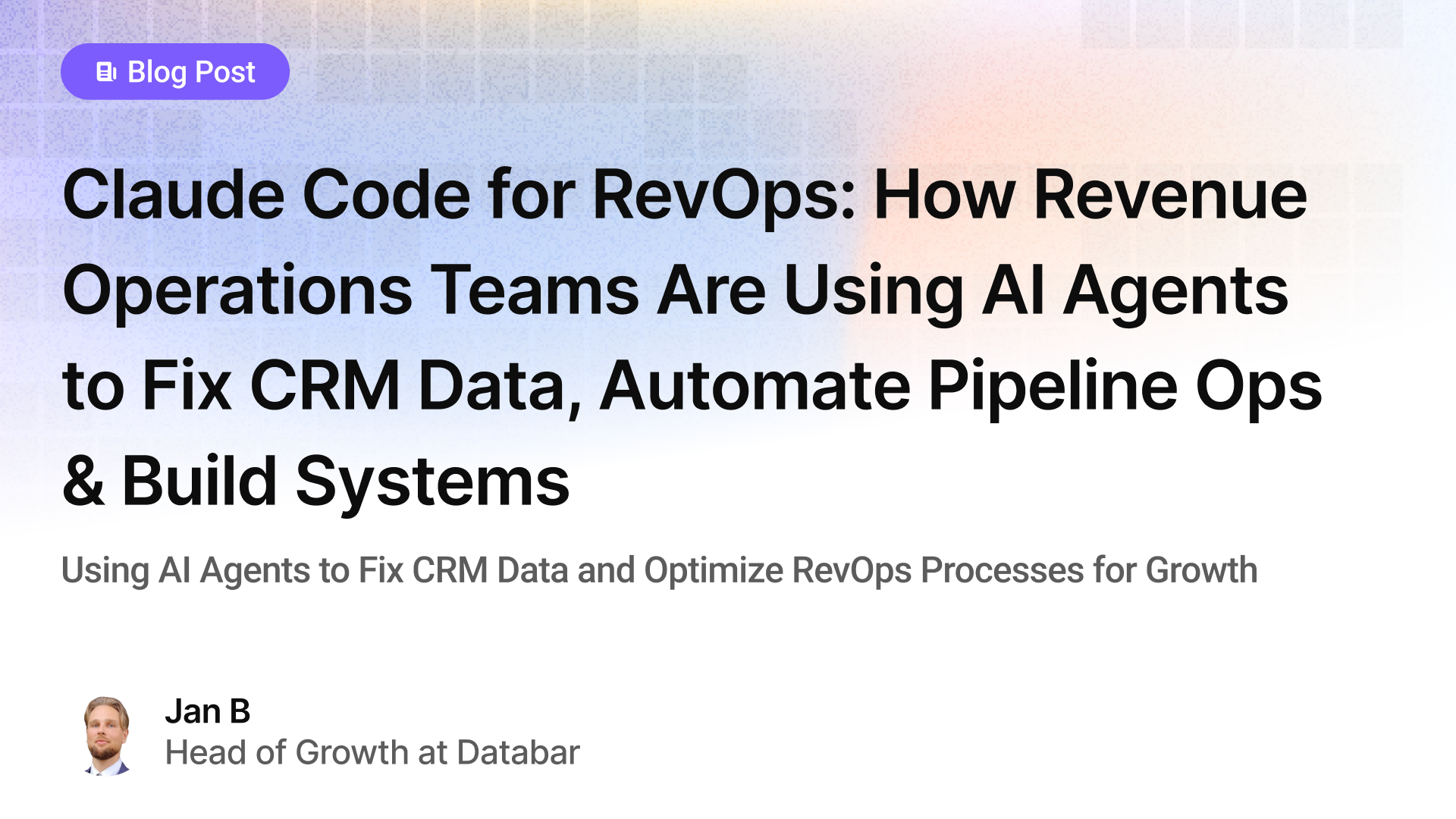
Claude Code for RevOps: How Revenue Operations Teams Are Using AI Agents to Fix CRM Data, Automate Pipeline Ops & Build Systems
Using AI Agents to Fix CRM Data and Streamline Revenue Operations for Scalable Growth
by Jan, February 24, 2026
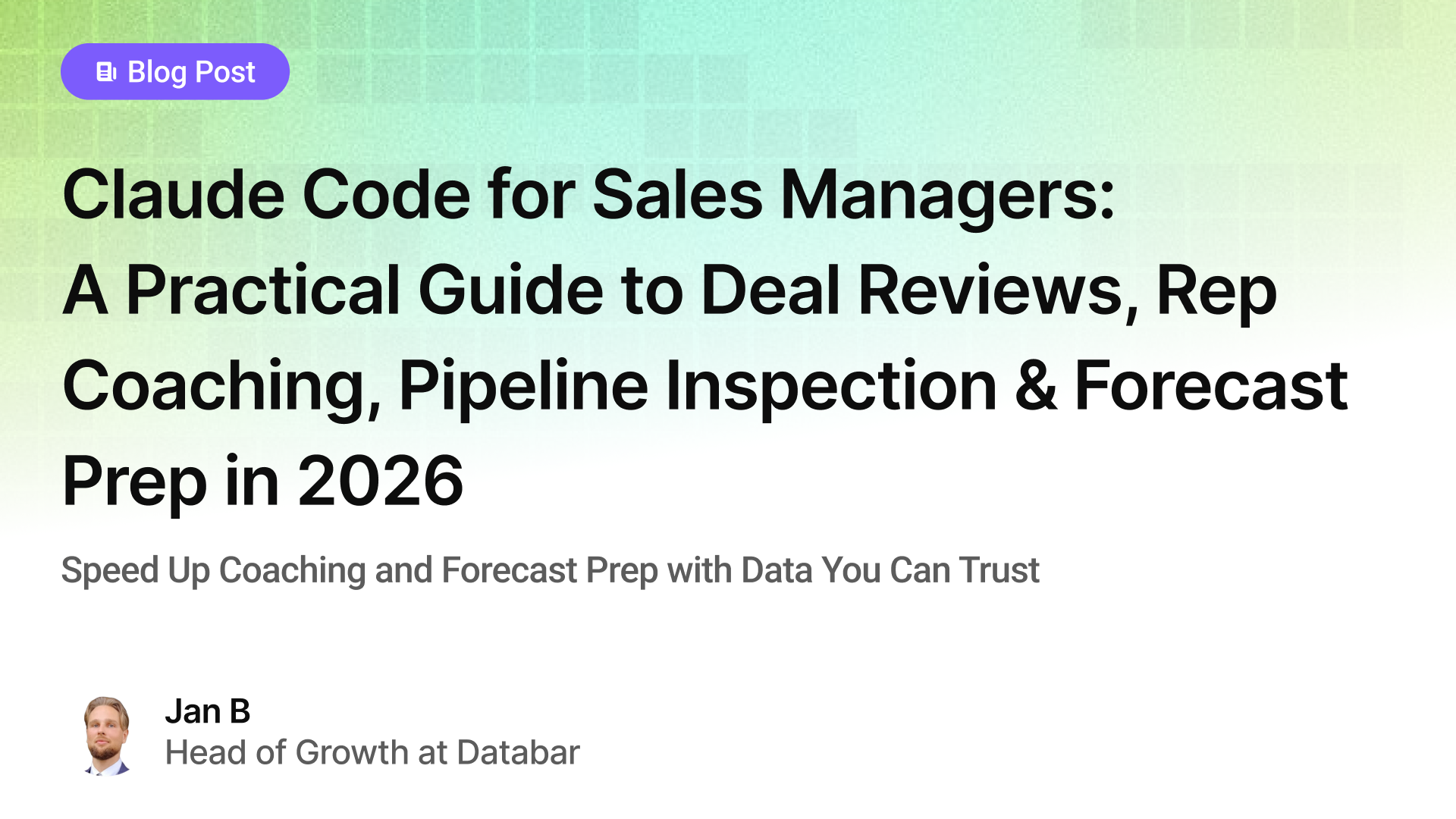
Claude Code for Sales Managers: A Practical Guide to Deal Reviews, Rep Coaching, Pipeline Inspection, and Forecast Prep in 2026
Speed Up Coaching and Forecast Prep with Data You Can Trust
by Jan, February 23, 2026
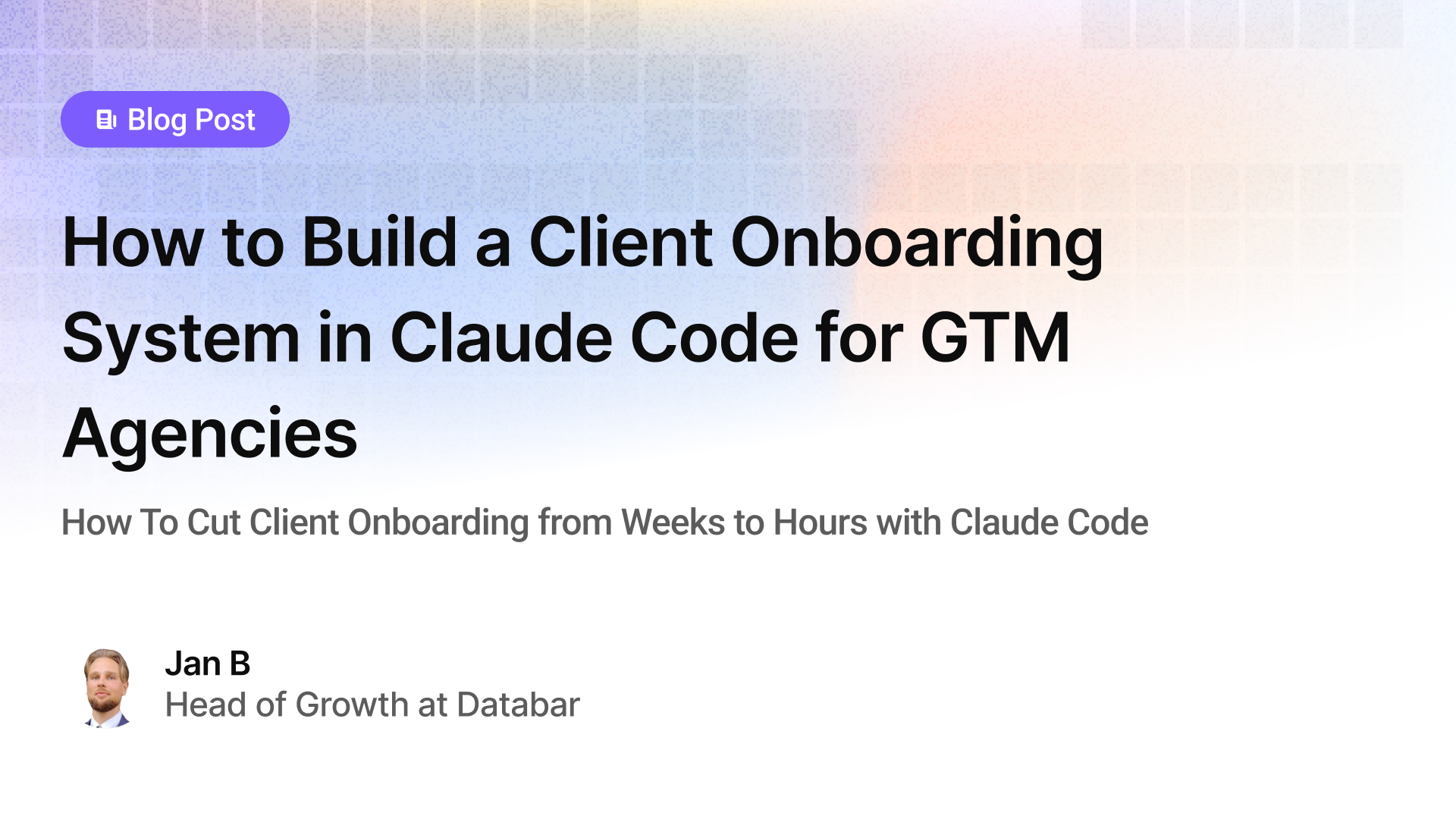
How to Build a Client Onboarding System in Claude Code for GTM Agencies
How To Cut Client Onboarding from Weeks to Hours with Claude Code
by Jan, February 22, 2026
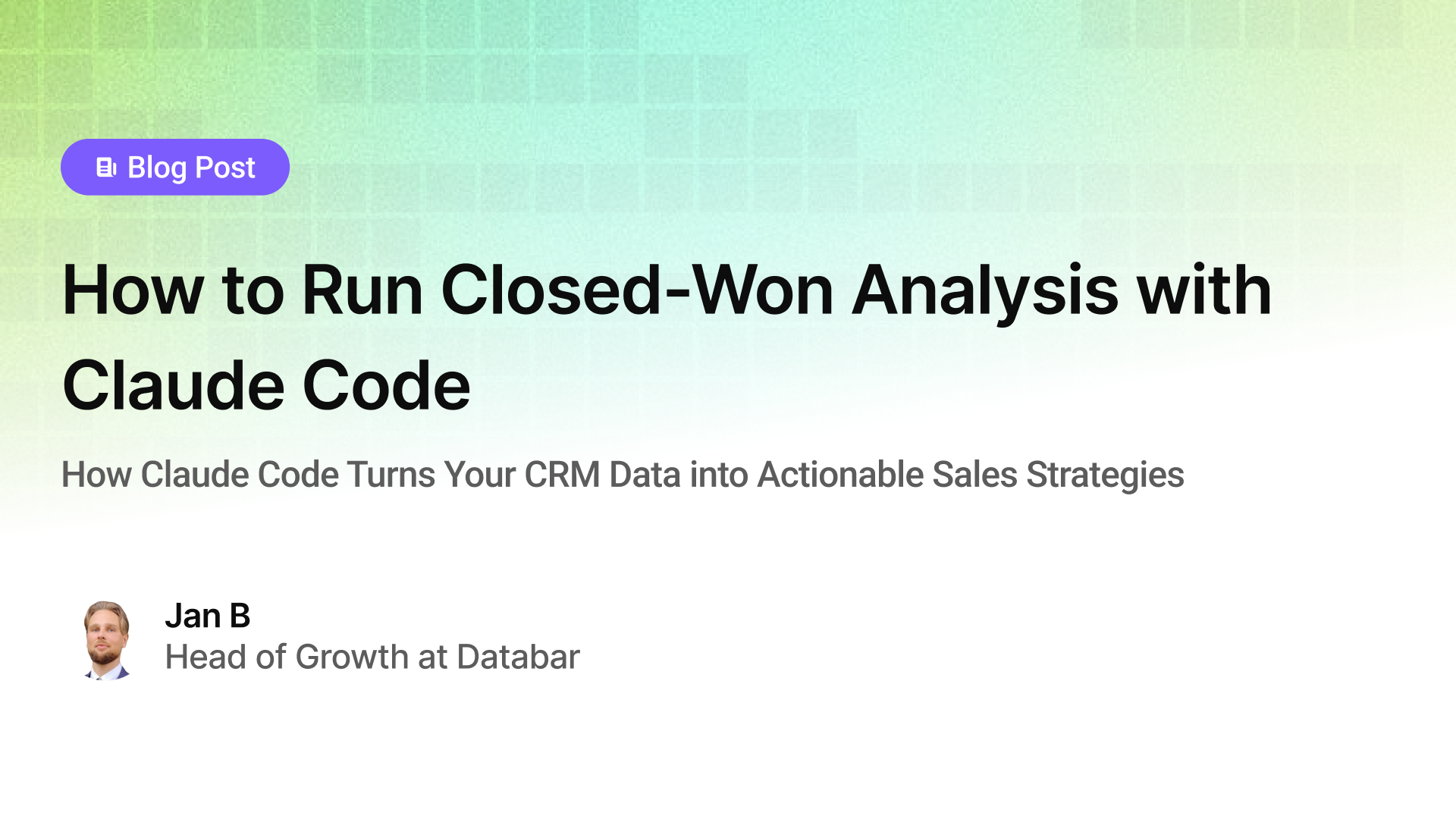
How to Run Closed-Won Analysis with Claude Code
How Claude Code Turns Your CRM Data into Actionable Sales Strategies
by Jan, February 21, 2026

